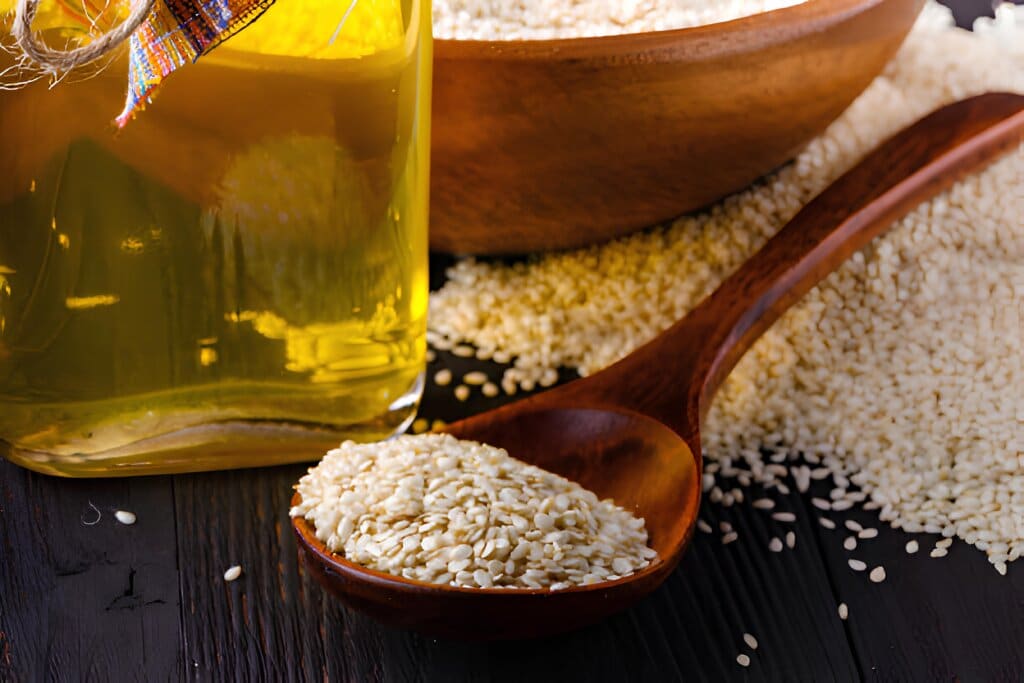How To Select Quality Sesame Seeds
Sesame seeds are widely used in kitchens and the food industry, especially for making sesame oil, bread, sweets, and various snacks. The quality of sesame seeds is essential for both flavor and nutritional value. So, how do you select high-quality sesame seeds? Here are some important factors to consider:
1. Type of Sesame
Sesame seeds are typically produced in two main types: white and black. White sesame seeds have a milder flavor and are commonly used in oils, pastries, and as an ingredient in sweet dishes. This type is ideal for those seeking sweetness and lightness. Black sesame seeds have a stronger and more distinctive flavor and are often used in traditional dishes, especially in Asian cuisine. Black sesame is also richer in nutritional value. When choosing, consider which type best suits the product you’re making.

2. Harvest Time and Ripeness
The harvest time of sesame seeds is one of the most important factors in determining their quality. Seeds should be harvested when they are fully mature. Unripe seeds can leave a bitter taste, while overripe seeds may affect the flavor quality. The ideal harvest time is when the seeds reach their highest sugar content and optimal acidity. Harvest timing directly impacts the taste and nutritional value of the seeds. Fresh and timely harvested seeds offer a richer and more aromatic flavor profile.
3. Storage Conditions and Freshness
Freshness is key when selecting sesame seeds. Seeds are prone to spoilage due to moisture and heat, which can cause them to go rancid and negatively affect the flavor, especially in oil extraction. Fresh sesame seeds yield higher quality and preserve their nutritional value. Proper storage is also essential. Seeds should be kept in a cool, dry place, away from light. This ensures that the seeds stay fresh longer and maintain their quality.
4. Appearance and Size
Quality sesame seeds should be clean and uniform in appearance. The seeds should be processed smoothly, free from cracks, debris, or contamination. Small, cracked, or broken seeds are often signs of poor quality. Additionally, larger seeds typically contain more oil and nutrients. Larger seeds tend to produce better oil and are generally associated with a richer flavor profile. The outer surface of the seeds should be smooth and the color should be uniform, without any foreign matter or dirt.
5. Aroma and Flavor
The aroma of fresh sesame seeds is an important indicator of their quality. High-quality sesame seeds emit a mild, nutty, and sweet fragrance. Stale or improperly stored seeds may emit sour, acidic, or metallic odors. These off-putting smells indicate that the seeds are of poor quality or have not been stored correctly. Fresh seeds, on the other hand, should have a sweet and nutty aroma, signaling that the seeds are fresh and have been processed properly. Flavor-wise, high-quality seeds offer a delicate bitterness and balanced taste.
6. Storage Duration and Expiration Date
In addition to freshness, the storage duration of sesame seeds is critical. Pay attention to the expiration date of the seeds to ensure their quality. Typically, sesame seeds should be consumed within a few months of being harvested. Seeds stored for long periods can lose their flavor and nutritional value. Checking the expiration date when purchasing seeds can help you ensure you are buying a fresher, higher-quality product. Proper storage conditions will also extend the seeds’ shelf life.
7. Organic and Certified Products
Organic sesame seeds are grown without chemical fertilizers or pesticides, making them a healthier and more natural option. Organic-certified seeds are typically grown using environmentally friendly methods and tend to be of higher quality. Choosing organic sesame seeds ensures both better health benefits and a more sustainable environmental impact. Organic seeds often exhibit richer flavor profiles and higher quality compared to conventionally grown seeds.
Selecting high-quality sesame seeds is crucial not only for taste but also for health. Factors such as harvest timing, seed type, storage conditions, appearance, aroma, and flavor are essential to obtaining top-quality seeds. Fresh, properly stored, and carefully processed sesame seeds will provide the best flavor and nutritional value. By choosing the right sesame seeds, you can enhance the quality of your products, ensuring healthier and tastier results in both cooking and food production.
We’ve come to the end of our article. You can find all our blog posts here. Visit our website to explore our products.
Want More Information? Contact us today and let’s discuss how we can help you with your sesame seed needs!

